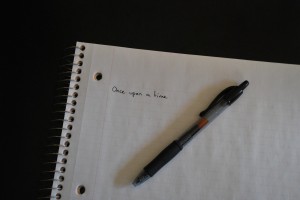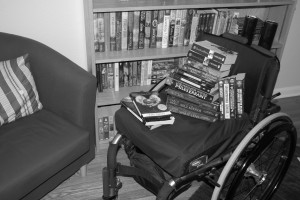 Last week, I talked about writing characters with disabilities and finding a balance between the two extremes. Because it would be easy to overplay your hand so a character is nothing except their wheelchair, or treat it with kid gloves so the disability is just another window dressing that fades into the background. Then I posed some questions for writers to really dig in and examine their characters and their motivations for writing them in the first place.
Last week, I talked about writing characters with disabilities and finding a balance between the two extremes. Because it would be easy to overplay your hand so a character is nothing except their wheelchair, or treat it with kid gloves so the disability is just another window dressing that fades into the background. Then I posed some questions for writers to really dig in and examine their characters and their motivations for writing them in the first place.
And I’m going to share a secret with you guys. Lean closer. Closer. Okay, you can’t tell anyone…I…write…characters with disabilities. Shocking, I know. So I decided to put my money where my mouth is and ask myself these same questions about Merry, the heroine of my young adult fantasy, By Wingéd Chair. So let’s see if she’s a person first.
Merry is a seventeen year old student who suffered a spinal cord injury three years prior to By Wingéd Chair. She uses a manual wheelchair that her father built.
- Is she more than her disability? A lot of Merry’s flaws come from her experience in the wheelchair. She is defensive to the point of hostility. She does not accept help gracefully, and she hides her vulnerability behind layer of snark and self-sufficiency. But there are other things that define Merry that have nothing to do with her disability. She is goal-oriented and persistent. She is courageous and funny. And her knowledge of the OtherRealms is second only to her father’s, which is what leads her to team up with Robyn Hode eventually. All of these things are affected by her disability, but they aren’t a result of it. They’d define her even if she was able-bodied.
- Is she more than one detail deep? Since I’m writing from personal experience, I tried to give readers many things that would ground them in Merry’s situation as well as her head. And I tried to stay away from stereotypes and tropes that are damaging to the character and reader alike. I did touch on going to the bathroom but that was more a nod to the time period and setting, not the stereotype. Movement is a huge consideration for Merry, and as a result, for me as the author. For instance, how do you navigate a fight in a wheelchair? And what happens when you’re kidnapped or stranded without your primary means of locomotion? Merry is faced with these questions and many more. And I consider her fears another detail that help round her out. There are the expected ones: who does she ask for help? Will anyone ever find her attractive? But there are others buried deeper. Merry is afraid of new situations. She’s afraid of losing what little control over her life she has. There are plenty more details, if you’re interested, over in the Accessible Excerpts series.
- Do they have heroic qualities above and beyond their ability to adapt? One of the things I love about Merry is that her strengths keep moving her forward despite the obstacles I throw at her. She doesn’t take no for an answer. Whether this entails dealing with her disability or not, Merry goes for what she wants. And she runs toward danger – well, rolls toward danger – disregarding the consequences. And she is loyal, even when presented with a temptation most in her situation would have to seriously think about.
- Is she healed at the end of the book? Hell no. Just as in real life, Merry will have to deal with her disability for the rest of her life. She is in a much better place emotionally at the end of the book, but physically she is the same. Even in fantasy reality has its limits.
So, all in all, I think Merry is a person first. Her disability plays a large role in her growth as a character because that was the story I wanted to write. But she is so much more than the sum of her physical abilities and by the end of the book she’s confident in who she is.


